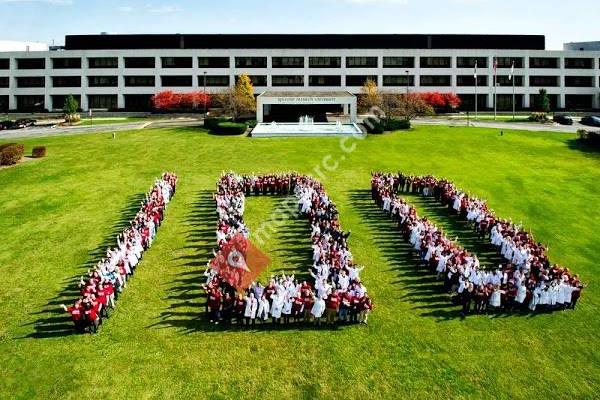



The Chicago Medical School is one of the graduate schools of Rosalind Franklin University of Medicine and Science. Founded in 1912, The Chicago Medical School (CMS) has nearly a 100 year history of a broadly-based socially constructive admission process relatively unlike that of other medical colleges. CMS was originally founded as a night school. Under the leadership of Dean John J. Sheinin CMS achieved full American Medical Association approval.
The non-profit Chicago Medical School operated from the beginning on the principle that admission should be based on merit alone. In particular, "Chicago Med" admitted women and minority applicants decades earlier than most professionals schools. As the school's 1912-13 bulletin states, "[I]t is the firm belief of the Faculty of this school that there are deserving men and women, who, if given a second opportunity, will soon 'catch up' with and even surpass those students who have had earlier opportunities and advantages." It delivered quality medical education to a wide range of students, by now numbering in the tens of thousands.
In 1935, Dr. John J. Sheinin became Dean and decided that the school must be saved. Prior to Dr. Sheinin, and due to CMS's lack of affiliation with a hospital the school had been struggling with financial problems. To help keep the school open in the 1940s, a wealthy retired Chicago businessman named Lester North Selig issued a challenge to his contemporaries in Chicago's business world: Did they or did they not support a medical school where admission was based on merit alone? By 1948, Dr. Sheinin had won accreditation for the school by consistently strengthening its curriculum along with its financial and community support.
Also under Dr. Sheinin the American Plan was developed. This policy stuck to the original policy of admission solely based on merit. Eleanor Roosevelt praised the plan in her nationally syndicated "My Day column: The American Plan...is simply a plan of nondiscrimination. Only two considerations govern the admission rules of [Chicago Medical School]- character and scholarship merit. One wishes that more schools and colleges and universities throughout the county would have the courage to set their standards high, but to eliminate two questions that all too often one finds on a request for admission: What is your race and what is your religion? It seems to me that these questions have no bearing on one's right to an education in whatever field of learning one has chosen to follow. The should have no bearing, either, on one's success in whatever profession that is prepared for."
CMS has a long history of public philanthropy and was one of the first to encourage students to perform community service as a natural outgrowth of a medical education. Students were historically required to serve in the Medical Clinic Free Dispensary and the Chicago Maternity Center in order to graduate. Currently students participate in many community service projects supporting the local community. In the view of former Dean Arthur J. Ross, III, "The current generation of students is the most altruistic, service-oriented generation ever to come through health care training- including generations older than me. It's the icing on the cake for them to study in a place that supports their service."
The Chicago Medical School currently has 763 students enrolled and over 6,500 alumni spread across the county practicing all specialties of medicine.
Vita In Inventione - Life In Discovery
 Rosalind Franklin University
57 meter
This place is a nightmare. It's located in a horrible area. The parking lots are impo...
Rosalind Franklin University
57 meter
This place is a nightmare. It's located in a horrible area. The parking lots are impo... Robert Morris University - Lake County
3 miles
Good group of instructors, at least that is the experience i've had. Awesome advisors...
Robert Morris University - Lake County
3 miles
Good group of instructors, at least that is the experience i've had. Awesome advisors... Tricoci University of Beauty Culture
4 miles
I have done hair cuts to spa treatments to upper lip wax's, they do an amazing job. ...
Tricoci University of Beauty Culture
4 miles
I have done hair cuts to spa treatments to upper lip wax's, they do an amazing job. ... VISIT COLLEGE, INC.
5 miles
VISIT COLLEGE, INC.
5 miles
 Facility Residence
5 miles
Facility Residence
5 miles
 Libertyville High School
6 miles
It’s a good school in theory but they don’t really push anyone to be anything more th...
Libertyville High School
6 miles
It’s a good school in theory but they don’t really push anyone to be anything more th... Libertyville Cooperative Nursery School
6 miles
This has been one of the best things that has happened for my son. Over the past thr...
Libertyville Cooperative Nursery School
6 miles
This has been one of the best things that has happened for my son. Over the past thr... DeVry University
7 miles
It has a 1 star rating because it's a small campus? Education is fantastic. That's wh...
DeVry University
7 miles
It has a 1 star rating because it's a small campus? Education is fantastic. That's wh... USML Feehan Library
7 miles
Like being in a European library from several hundred years ago. Simply classic. Did ...
USML Feehan Library
7 miles
Like being in a European library from several hundred years ago. Simply classic. Did ... University Center of Lake County
9 miles
I am working a corporate meeting here. The staff is very accommodating and the buildi...
University Center of Lake County
9 miles
I am working a corporate meeting here. The staff is very accommodating and the buildi...to add Chicago Medical School map to your website;
We use cookies and other tracking technologies to improve your browsing experience on our website, to show you personalized content and targeted ads, to analyze our website traffic, and to understand where our visitors are coming from. Privacy Policy